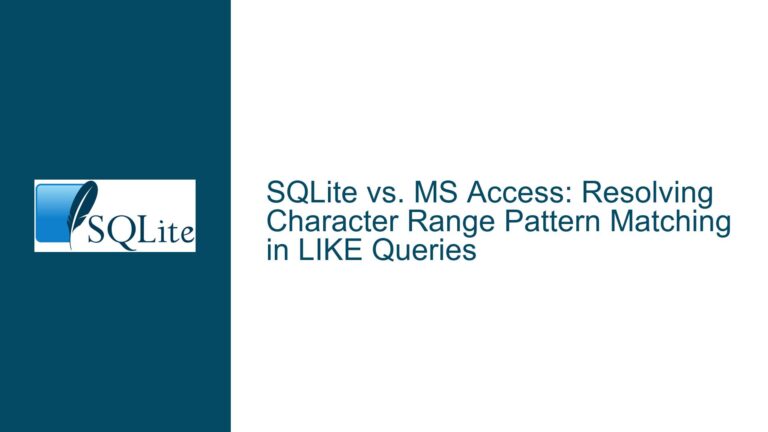Implementing Accent-Insensitive LIKE Queries in SQLite: Collations & Workarounds
Understanding Accent-Insensitive Text Search Limitations in SQLite
Issue Overview: Default Collation Behavior and Accent Sensitivity
SQLite’s default text comparison logic treats accented and unaccented characters as distinct. For example, élisa, Elisa, and Élisa are considered different strings. This behavior stems from SQLite’s reliance on byte-wise comparisons using the BINARY collation by default. While SQLite supports case-insensitive comparisons via the NOCASE collation (LIKE '%elisa%' COLLATE NOCASE), there is no built-in collation for accent insensitivity. This creates challenges for queries requiring diacritic-agnostic matching, such as matching Elisa to élisa in a LIKE clause.
The root of the problem lies in Unicode normalization. Characters with diacritics (e.g., é, ñ) have distinct code points from their base characters (e.g., e, n). SQLite does not automatically normalize these characters unless explicitly instructed to do so via custom collations or extensions. Without such mechanisms, developers must implement workarounds to achieve accent-insensitive matching.
Why Accent-Insensitive Matching Fails: Collation Gaps and Data Representation
Possible Causes of Accent-Sensitive Behavior
Absence of Built-In Unicode-Aware Collations:
SQLite’s core distribution does not include collations that normalize Unicode characters. TheNOCASEcollation only handles ASCII case folding, not Unicode equivalence or diacritic stripping. For example,NOCASEwill matchElisaandelisabut notÉlisa.Collation Implementation Complexity:
Creating a custom collation requires writing C/C++ code, registering it viasqlite3_create_collation(), and ensuring it is available at runtime. This is non-trivial for developers unfamiliar with SQLite’s C API or those working in higher-level languages like Python or JavaScript.Data Storage Without Normalization:
If text data is stored without prior normalization (e.g., using NFC or NFD forms), even custom collations may fail to match equivalent characters. For example,écan be represented as a single code point (U+00E9) or as a combination ofeand an acute accent (U+0065 U+0301).Case Sensitivity Interactions:
Combining case insensitivity (COLLATE NOCASE) with accent insensitivity requires custom logic. The default collations do not stack or compose these transformations.
Strategies for Accent-Insensitive Queries: Collations, Extensions, and Alternatives
Troubleshooting Steps, Solutions & Fixes
1. Implementing Custom Collations via SQLite’s C API
To create a NOACCENTS collation, you must write a C function that strips diacritics before comparing strings. Here’s a simplified example:
#include <sqlite3.h>
#include <wctype.h> // For Unicode functions (requires linking with ICU or similar)
void noaccents_collation(
void *arg,
int len1, const void *str1,
int len2, const void *str2
) {
// Normalize and strip accents from both strings
// (Implementation requires Unicode normalization logic)
int result = compare_normalized(str1, str2);
sqlite3_result_int(result);
}
// Register the collation in SQLite
sqlite3_create_collation(db, "NOACCENTS", SQLITE_UTF8, NULL, noaccents_collation);
Challenges:
- Unicode Normalization: The collation must decompose characters (e.g.,
É→E + ´) and remove combining marks. This requires ICU or a minimal Unicode library. - Performance: Real-time normalization can slow down queries on large datasets.
- Portability: The collation must be compiled and linked with the application.
Workflow:
- Use a Unicode library to decompose and strip diacritics.
- Register the collation with SQLite.
- Execute queries with
COLLATE NOACCENTS:SELECT aColumn FROM aTable WHERE aColumn LIKE '%Elisa%' COLLATE NOACCENTS;
2. Using Precomputed Normalized Columns
If custom collations are impractical, precompute a normalized version of the column:
ALTER TABLE aTable ADD COLUMN aColumn_normalized TEXT GENERATED ALWAYS AS (
strip_accents(aColumn) -- Hypothetical function; requires implementation
) VIRTUAL;
CREATE INDEX idx_normalized ON aTable(aColumn_normalized);
SELECT aColumn FROM aTable WHERE aColumn_normalized LIKE '%elisa%' COLLATE NOCASE;
Steps:
- Add a generated column that stores the accent-stripped text.
- Use an index for faster searches.
- Query the normalized column with
COLLATE NOCASEfor case insensitivity.
Limitations:
- Requires a way to compute
strip_accents(e.g., via SQLite user-defined functions). - Increases storage and maintenance overhead.
3. Leveraging the ICU Extension
SQLite’s ICU extension provides Unicode-aware collations and normalization.
Setup:
- Compile SQLite with ICU support:
./configure --with-icu - Load the extension and use ICU collations:
SELECT aColumn FROM aTable WHERE aColumn LIKE '%Elisa%' COLLATE icu_und;
ICU Collation Options:
icu_und: Root locale with Unicode defaults.icu_und_nocase: Case-insensitive root collation.
Normalization:
Use ICU functions to normalize text before storage:
-- Normalize to NFC form
INSERT INTO aTable (aColumn) VALUES (icu_normalize('élisa', 'NFC'));
4. User-Defined Functions for Accent Stripping
Define a SQL function to remove accents dynamically:
# Python example using sqlite3
import sqlite3
import unicodedata
def strip_accents(text):
return ''.join(
c for c in unicodedata.normalize('NFD', text)
if unicodedata.category(c) != 'Mn'
)
conn = sqlite3.connect(':memory:')
conn.create_function('strip_accents', 1, strip_accents)
# Query using the function
cursor = conn.execute(
"SELECT aColumn FROM aTable WHERE strip_accents(aColumn) LIKE strip_accents('%Elisa%')"
)
Caveats:
- User-defined functions cannot use indexes, leading to full table scans.
- Dynamic normalization is computationally expensive.
5. Hybrid Approach: Collation + Preprocessing
Combine collations with input preprocessing:
-- Preprocess the search term in the application layer
search_term = 'Elisa'
normalized_term = strip_accents(search_term).lower()
-- Query using the preprocessed term
cursor.execute(
"SELECT aColumn FROM aTable WHERE strip_accents(aColumn) LIKE ?",
(f'%{normalized_term}%',)
)
Advantages:
- Avoids modifying the database schema.
- Works with indexed columns if using a generated column for
strip_accents(aColumn).
Final Recommendations
- For Small Datasets: Use user-defined functions or application-layer normalization.
- For Large Datasets: Precompute normalized columns with indexes.
- For Full Unicode Support: Compile SQLite with ICU and use its collations.
- Avoiding C Extensions: Use Python, Java, or other languages to handle normalization externally.
Each method balances complexity, performance, and maintainability. Choose based on your project’s constraints and scalability needs.






